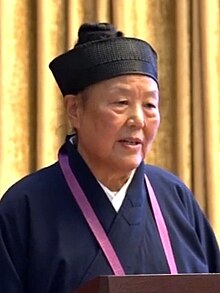Wu Chengzhen (Chinese: 吳誠真; born 14 January 1957) is the first woman to become a Fangzhang (principal abbess) in the history of Taoism, which occurred in 2009.[1]
Wu Chengzhen | |
|---|---|
吳誠真 | |
 Wu in 2023 | |
| Born | Wu Yuanzhen January 14, 1957 |
| Nationality | Chinese |
| Occupation | Taoist abbess |
| Years active | 1984–present |
| Known for | First principal female abbess in Taoist history |
Early life
editWu Yuanzhen (Chinese: 吳元真) was born on 14 January 1957, in Xinzhou District, Wuhan, Hubei province, China as the youngest daughter of a family of six brothers and sisters. As a child, Wu read books belonging to her relatives about Buddhism, Christianity and Taoism.[2] Before the Cultural Revolution, she was able to finish high school and began working as an accountant, but no options for formal higher education were open to her.[3] Wu began self-study, reading texts on philosophy, theology and enlightenment[2] and at the age of 23 she followed an older sister's lead, making a commitment to Taoism, and changed her name to Wu Chengzhen.[3]
Career
editEarly career
editWu began work as a cook and gardener at the Changchun Taoist Temple of Wuhan.[3] She studied with Xie Zhongxin, the 22nd fangzhang of Baiyun Temple in Beijing and after four years, in March 1984 she became a monk.[2][4] The Changchun Temple, built during the Yuan dynasty, is one of the most important in China.[5] In 1995, Wu was appointed the temple's zhuchi (lower-ranking abbess),[3] and was selected as vice president of the Taoist Association of Wuhan.[5] One of her main duties is fundraising. Taoist clergy depend on public donations for their public works projects. Wu reportedly has around 10,000 followers who annually donate at least 2 million yuan (US$292,920),[6] used to care for the poor and children who have dropped out of school, widows, as well as for construction projects for bridges, roads,[4] schools, and disaster relief.[3]
Later career
editIn 2001,[3] Wu completed a master's degree in philosophy at Huazhong University of Science and Technology She became president of both the Hubei province and Wuhan Taoist Associations in 2007.[2] In 2009, Wu began studying for her doctorate degree at Renmin University of China with a thesis topic which evaluates the function of Taoism in creating a harmonious society.[3] In 2009, she was unanimously elected by all of the leaders in all the Changchun Temple's departments to serve as their principal abbess.[3] She became such on 15 November, 2009.[2][4][6] In 2014, Wu traveled to the United States and helped found the U.S. Taoist Association.[7]
References
edit- ^ "First female Taoist Fangzhang enthroned". Chinadaily.com.cn. Retrieved 2010-11-19.
- ^ a b c d e "首位道教女方丈:走在修炼的路上 至真至诚吴诚真". China Daily (in Chinese). Beijing, China. 14 December 2009. Retrieved 6 December 2015.
- ^ a b c d e f g h Nilsson, Erik; Rui, Guo. "First woman leader of Taoist clerical orthodoxy". China Daily. Beijing, China. Retrieved 6 December 2015.
- ^ a b c "First Chinese principal Taoist abbess". Beijing, China: People's Daily. 17 November 2009. Retrieved 6 December 2015.
- ^ a b "中国道教首位女方丈诞生 千余信众欢聚相庆(图)" (in Chinese). Wuhan, China: Sohu. 15 November 2009. Retrieved 6 December 2015.
- ^ a b Keen, Zhang; Wu, Jin (17 November 2009). "Daoists appoint first ever female abbot". Beijing, China: China Organization. Retrieved 6 December 2015.
- ^ Ash, Lorraine (17 November 2014). "East Hanover hosts rare Taoist ceremonies". East Hanover, New Jersey: Daily Record. Retrieved 6 December 2015.